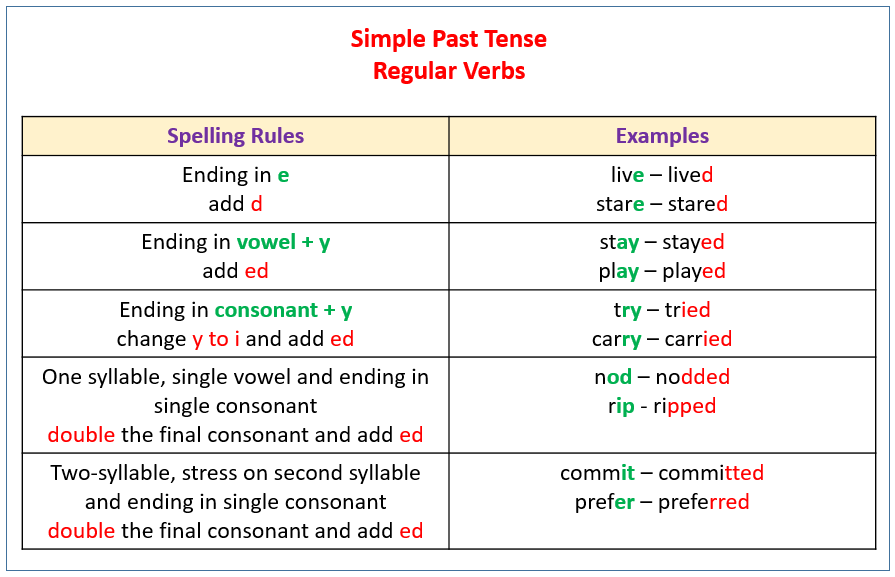
https://www.onlinemathlearning.com/image-files/xpast-tense-verbs.png.pagespeed.ic._KWd-JIOWV.png
SIMPLE PAST:
The "simple past" is used to talk about an action that ended in a time before the current one. The duration is not relevant. The time in which the action is located may be the recent past or a distant past.
EXAMPLES
- · John Cabot sailed to America in 1498.
- · My father died last year.
- · I lived in Fiji in 1976.
- · We crossed the Channel yesterday.
The
"simple past" is always used to refer to when something happened, so
it is associated with certain temporary expressions that indicate:
- · frequency: often, sometimes, always
I sometimes walked home at lunchtime.
I often brought my lunch to school.
- · a certain time: last week, when I was a child, yesterday, six weeks ago
We saw a good film last week.
Yesterday, I arrived in Geneva.
She finished her work atseven o'clock
I went to the theater last night
- · an indeterminate time: the other day, ages ago, a long time ago People lived in caves a long time ago.
- · She played the piano when she was a child.
Note: the term ago is useful for
expressing temporal distance in the past. It is placed after the period of time
in question: a week ago, three years ago, a minute ago.
Beware: the "simple past" of
English may resemble a verb tense in your own language and yet its meaning may
be different.
FORMATION
OF THE "SIMPLE PAST"
FORMATION
OF "SIMPLE PAST" WITH REGULAR VERBS
Afirmativa
|
||
Sujeto
|
+ raíz + ed
|
|
I
|
skipped.
|
|
Negativa
|
||
Sujeto
|
+ did not
|
+ infinitivo sin to
|
They
|
didn't
|
go.
|
Interrogativa
|
||
Did
|
+ sujeto
|
+ infinitivo sin to
|
Did
|
she
|
arrive?
|
Interrogativa negativa
|
||
Did not
|
+ sujeto
|
+ infinitivo sin to
|
Didn't
|
you
|
play?
|
TO WALK
Afirmativa
|
Negativa
|
Interrogativa
|
I walked
|
I didn't walk
|
Did I walk?
|
You walked
|
You didn't walk
|
Did you walk?
|
He walked
|
He didn't walk
|
Did he walk?
|
We walked
|
We didn't walk
|
Did we walk?
|
They walked
|
They didn't walk
|
Did they walk?
|
"SIMPLE PAST"
DE LOS VERBOS TO BE, TO HAVE, TO DO
Sujeto
|
Verbo
|
||
Be
|
Have
|
Do
|
|
I
|
was
|
had
|
did
|
You
|
were
|
had
|
did
|
He/She/It
|
was
|
had
|
did
|
We
|
were
|
had
|
did
|
You
|
were
|
had
|
did
|
They
|
were
|
had
|
did
|
NOTES ON THE AFFIRMATIVE, NEGATIVE AND
INTERROGATIVE CONSTRUCTIONS
AFFIRMATIVE
The affirmative form of the "simple
past" is simple.
- I was in Japan last year
- She had a headache yesterday.
- We did our homework last night.
- NEGATIVE AND INTERROGATIVE
- For the negative and interrogative forms of the "simple past" of the verb "do" as an ordinary verb, it is used as auxiliary "do", e.g. We did not do our homework last night.
- The negative form of the verb "have" in "simple past" is usually constructed using the auxiliary "do", although sometimes only not or the contraction "not" is added.
The interrogative form of the verb
"have" in "simple past" usually uses the auxiliary
"do".
EXAMPLES
- They were not in Rio last summer.
- We did not have any money.
- We did not have time to visit the Eiffel Tower.
- We did not do our exercises this morning.
- Were they in Iceland last January?
- Did you have a bicycle when you were young?
- Did you do much climbing in Switzerland?
Note: to construct the negative and
interrogative forms of all the verbs in "simple past", the auxiliary
'did' is always used.
"SIMPLE PAST": IRREGULAR VERBS
Some verbs make the "simple
past" irregularly. These are the most common.
TO GO
- He went to a club last night.
- Did he go to the cinema last night?
- He didn't go to bed early last night.
TO GIVE
- We gave her a doll for her birthday.
- They didn't give John their new address.
- Did Barry give you my passport?
TO COME
- My parents came to visit me last July.
- We didn't come because it was raining.
- Did he come to your party last week?
Put the verbs into the simple past:
- Last year I (go) to England on holiday.
- It (be) fantastic.
- I (visit) lots of interesting places. I (be) with two friends of mine .
- In the mornings we (walk) in the streets of London.
- In the evenings we (go) to pubs.
- The weather (be) strangely fine.
- It (not / rain) a lot.
- But we (see) some beautiful rainbows.
- Where (spend / you) your last holiday?
Write the past forms of the irregular verbs.
| Infinitive | Simple Past | |
|---|---|---|
| 1. |
meet
|
.
|
| 2. |
drive
|
.
|
| 3. |
speak
|
.
|
| 4. |
put
|
.
|
| 5. |
write
|
.
|
| 6. |
sing
|
.
|
| 7. |
do
|
.
|
| 8. |
sit
|
.
|
| 9. |
stand
|
.
|
| 10. |
run
|
.
|
Taken from:
Today's lesson is by Stephanie.

No hay comentarios:
Publicar un comentario